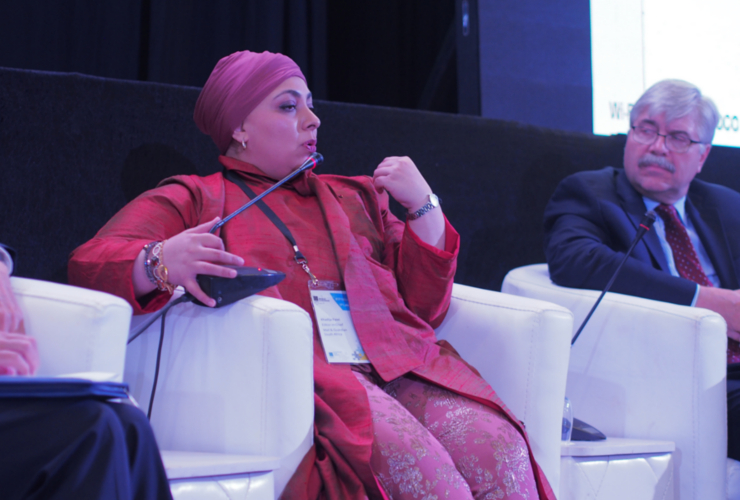As part of a series of interviews with the International Press Institute (IPI)’s new Executive Board members, this week we spoke to Khadija Patel, editor-in-chief of South Africa’s Mail & Guardian and co-founder of the award-winning youth news portal The Daily Vox.
South Africa is considered a leader in media freedom in Africa, with the press enjoying a high degree of freedom and independent news being valued by the general population, though political and economic pressure on the media increased under former President Jacob Zuma, who was forced to resign earlier this year.
Patel, who was elected to the Executive Board at IPI’s recent General Assembly in Abuja, Nigeria, shared her views on the current picture of press freedom in South Africa under new President Cyril Ramaphosa as well as the effects of the worldwide phenomena of “fake news” and increasing manipulation of public opinion via online means.
IPI: What do you consider the largest threat to free media in South Africa?
Patel: One of the greatest threats to media freedom is the financial pressure faced by media companies. For example, the Huffington Post has had to shut down in South Africa, and this trend is replicating across the country, causing jobs to be lost. It’s worrying times for the future of journalism, and the free press and its future, (with the risk of) becoming vulnerable to capture by state or economic forces. We are also seeing an increase in harassment of journalists online and coordinated campaigns against particular journalists.
IPI: With the recent presidential transition in South Africa, how does the future of journalism look?
Patel: There is an appreciation for the value of media being driven by our new president, who has consistently said that it is the media who does the important work in exposing wrongdoing in government. I think that President Ramaphosa certainly has a less adversarial approach to the media than his predecessor, who did not view good relations with the press as a priority. However, I would caution: It is the early days of his presidency and his own opinion may change if the media begins to poke holes in his administration. My sincere hope is that President Ramaphosa understands that the value of the media is greater than that of any one politician.
IPI: How do you view the threat of “fake news” to reliable, independent journalism?
Patel: Fake news is as much a problem in South Africa as it is everywhere else. It’s a particular problem over channels such as WhatsApp, where completely incorrect messages are simply passed from person to person. Such messages take advantage of certain moments, especially within the political space.
The other level that South Africa has grappled with is campaigns to discredit journalists and their work by essentially promoting one particular opinion, by simply promoting fake news. Politics is also smarting up to their (politicians’) ability to manipulate news using social platforms – I think this will be very interesting, as South Africa is moving towards an election next year.
IPI: What motivates you to serve on the board of an organization like IPI?
Patel: I think IPI is an especially important organization for those working in media all over the world. The fact that IPI is a network of people in media – everyone who has a vested interest in the health of media – is important. IPI’s work is tremendously important and it is a humbling opportunity for me to be able to contribute to this.
IPI: As the editor-in-chief of a major newspaper and co-founder of The Daily Vox, what does belonging to the IPI network mean for you?
Patel: I hope for my publications to be able to contribute to discussions about strengthening media freedom and to participate in conversations about the transformation of the international media landscape. It is important for us to rally to the cause of media freedom, crafting the future of what we are doing, as a group, with a strong platform.
Interview by Alexander White for IPI.
[separator style_type=”none” top_margin=”15″ bottom_margin=”20″ sep_color=”#eae9e9″ border_size=”” icon=”” icon_circle=”no” icon_circle_color=”#ffffff” width=”” alignment=”center” class=”” id=””]
[content_boxes layout=”clean-horizontal” columns=”1″ icon_align=”left” title_size=”18″ backgroundcolor=”#dcdadb” icon_circle=”” icon_circle_radius=”” iconcolor=”#dcdadb” circlecolor=”#dcdadb” circlebordercolor=”#dcdadb” circlebordercolorsize=”” outercirclebordercolor=”#dcdadb” outercirclebordercolorsize=”” icon_size=”” link_type=”” link_area=”” animation_delay=”” animation_offset=”” animation_type=”0″ animation_direction=”down” animation_speed=”0.1″ margin_top=”0″ margin_bottom=”0″ class=”” id=””]
[content_box title=”” icon=”” backgroundcolor=”#dcdadb” iconcolor=”#000000″ circlecolor=”#dcdadb” circlebordercolor=”” circlebordercolorsize=”” outercirclebordercolor=”” outercirclebordercolorsize=”” iconrotate=”” iconspin=”no” image=”” image_width=”35″ image_height=”35″ link=”” linktarget=”_self” linktext=”” animation_type=”0″ animation_direction=”down” animation_speed=”0.1″]
Read more from our series of interviews with new IPI Executive Board members:
#MemberInterview: Tom Mshindi on future of Kenya’s media (Tom Mshindi, editor-in-chief, Nation Media Group, Kenya)
[/content_box]
[/content_boxes]
